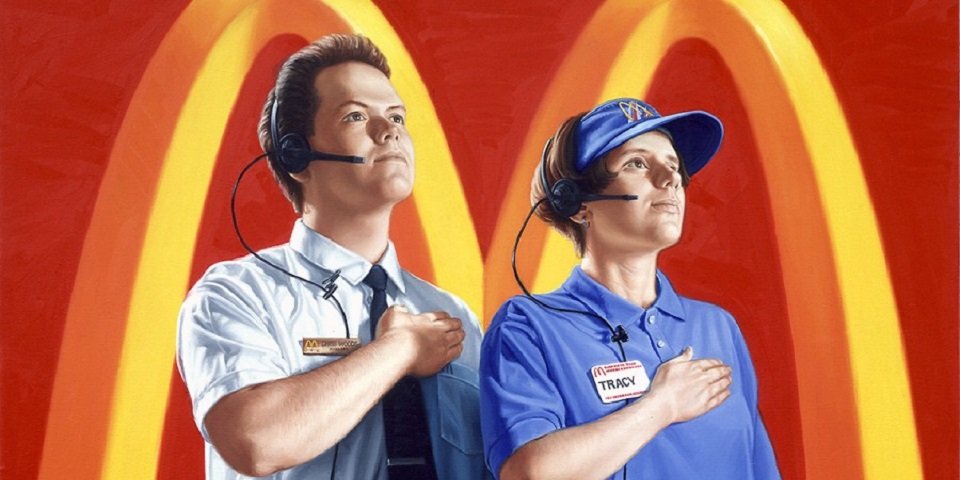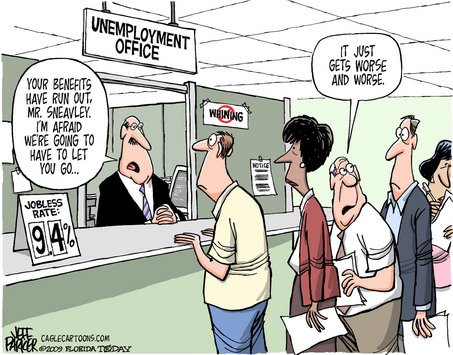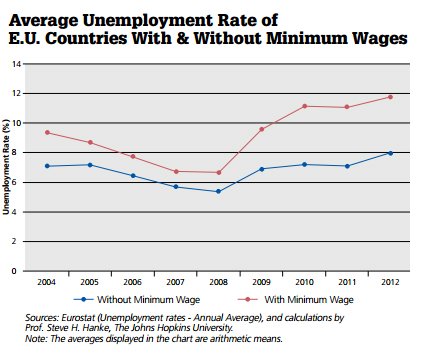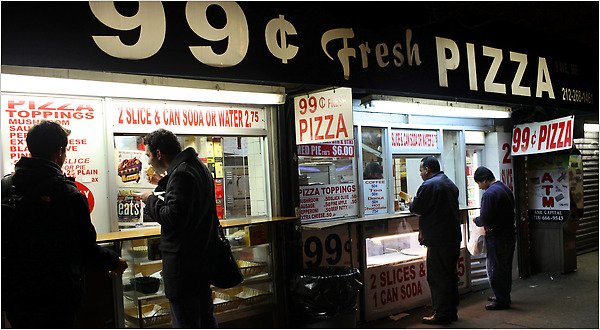
Price controls don't work
In Venezuela, they put price controls on toilet paper. The toilet paper has a maximum price. Because of the rampant inflation, the people running the shops can’t make a profit at that price, so they choose not to stock toilet paper. The maximum price leads to a shortage of supply.
Conversely, if you set a minimum price on labour, the people who want to buy the labour can’t make a profit at that price, so they choose not to hire. A minimum price on labour leads to a glut of supply - the unemployed.

This is backed up by the fact that, EU countries without a minimum wage have a consistently lower unemployment rate.

"I've been told that a minimum wage doesn't affect employment"
This claim is often repeated by advocates of this legislation. However, when pressed for a source, what normally comes up is a study which makes the more subtle and more nuanced claim, that "modest minimum wage adjustments lead to a small, or zero, effect on employment." Source - Australian Fair Work Commission
So, a small increase has no measurable effect. A big increase or a big decrease may indeed have a big effect.
Or, they cite the famous study by Card and Krueger, which involved surveying employers before and after a minimum wage increase. However, if companies went out of business because of the increase, there would be no way they could respond to the survey. This methodology was criticised by economist Thomas Sowell, when he wrote "reports based on surveying only survivors can create as false a conclusion as interviewing people who have played Russian roulette."
When Neumark and Wascher re-evaluated the data, using payroll records as opposed to phone surveys, they found that the data showed an opposite result - instead of an increase of a 17.6% increase in employment, they found a 4.6% decrease in employment. Source - Neumark and Wascher
Of course, certain other studies find that a minimum wage does have the effect of increasing unemployment, though it's only noticeable when the youth employment in particular is examined. Source - Economic Policy
The robotic capitalist
Many people will try to tell you that if there were no such thing as a minimum wage, businesses would pay their workers mere pennies, because a capitalist's incentive is to make money, and that must mean cutting costs.
I call this the "robotic capitalist theory", where the capitalist wakes up in the morning and eats a toast sandwich for breakfast, and rides to work on a rusty 50 year old bicycle, because his only way of processing the world is through his incentive to make or save money.

The common response to that is, obviously a capitalist is likely to behave differently in his personal life compared to his professional one. He saves money in the workplace by cutting corners, and then he spends it at home on luxuries. However, if he cuts corners so much, unable to pay more for quality workers, that would mean that the service and products of the company would suffer, thereby leading to lower profits, and finally leading to less money for the capitalist to enjoy in his personal time. So, capitalists are incentivised to pay for quality when it comes to materials and workers.
One statistic which supports this idea, is the fact that, in 2014, approximately 1.7% of the workforce in the USA earned exactly the prevailing federal minimum wage. That means, the vast majority of employees are paid more - not because they're forced to, but because their employers have decided voluntarily that it benefits them to do so. Source - US Bureau of Labor Statistics
The maximum pizza price law

If capitalists really are only driven by the desire for money, manifesting itself in cutting costs - it must also manifest itself in increasing prices. I've never been to a town yet which has a maximum pizza price law. And yet, pizzas are normally reasonably priced according to the quality of the pizza, and the convenience of the time and place it's served.
The reason that no pizzería owner charges one million dollars for a pizza is simple: nobody would pay that much. For much the same reason, a mandatory minimum wage is unnecessary, because workers are only going to accept an amount which is reasonable to them. The higher the demand for that worker's skills, the more they can reasonably charge.
"But how much would they really pay, if not for the minimum wage?"
As it turns out, countries without minimum wages tend to have higher median salaries compared to those with such laws, when comparing them to similar countries.
For example, the typical Norwegian worker earns more than any other in the world, and the typical Swedish worker comes out second. Both of these countries have no minimum wage. Source - The Local (from Gallup)
Now, that's not to say that the lack of a minimum wage necessarily causes a workforce to be more prosperous. However, whatever effect the lack of a mandatory minimum wage has on workers, it's obviously not enough to keep them from being prosperous.
"Don't you think they deserve a certain minimum?"
I don't know what they deserve. I don't know what anyone deserves, and it's not up to me to decide what they deserve. That's why I try to keep my nose out of other people's business, at least when it comes to forcing people to do things, which leads me to my next point.
Call a spade a spade
Let's look at what an advocate of a minimum wage is really calling for.

Obviously you want people to be paid at least a certain minimum, and you want employers to pay them at least that certain minimum. Those parts sound quite sound, logical, and compassionate. But how will you enforce such a thing? Legislation isn't magic. Politicians don't have the power to wave a magic wand, and suddenly make wages increase. So how does it happen?
Legislators write down their words, and regulators investigate businesses to find if they're really paying the minimum. If the employer isn't paying the minimum, they will be threatened, probably with a fine, and the opportunity to backpay the employee. If the employer refuses, after some time, they will be presented with another, vaguely worded, threat - the threat that a man with a firearm will come and take the employer to put him in a cage. If the armed person arrives, and the employer still resists, he may be shot, and he may be killed. A mandatory minimum wage comes down to a threat of violence - no more glamorous than the work of a common thug.
Perhaps you think, "That's how capitalist scum should be treated!" But remember, we're not just talking about the CEOs of Walmart and Safeway here. We are talking about the guy who runs the taco stand on the corner, the Italian immigrant trying his best to make you a great cup of coffee, the local newsagent who sells you a cold drink, the deli owner, and many more people who make up your community. We are not talking about capitalist robots, but real people who provide real services - real people with ambitions.
If you say it clearly, if you call a spade a spade, it doesn't sound so great. Maybe you like "supporting a liveable wage." But try to say "I support threats of violence against people who don't comply with my demands" and suddenly it doesn't sound so palatable.
If a mandatory minimum wage is so bad, why does it get so much support?
Not everyone loses out from having a mandatory minimum wage. Of course, certain workers will get a wage increase when the minimum wage goes up. But more importantly, certain powerful interests stand to gain from an increase in a minimum wage. It is rather easy for large companies to bear the costs of such an increase, sometimes by getting exemptions, sometimes by getting corporate welfare. It's very difficult for small business owners to maintain their size, much less expand, when they are confronted with such an increase. So, such a law acts as a form of protectionism for large companies.
Ironically, advocates of the minimum wage believe that it will reduce big corporate power. In reality, the exact opposite is true.
Conclusion
When you have a proposition such as a mandatory minimum wage law, which involves threatening violence against peaceful people, with very little evidence that it does anything positive for an economy, and quite a bit of evidence that it may harm an economy, and strong lines of reasoning that indicate it will harm the very people it intends to aid, that is not a proposition that anyone should be supporting.

